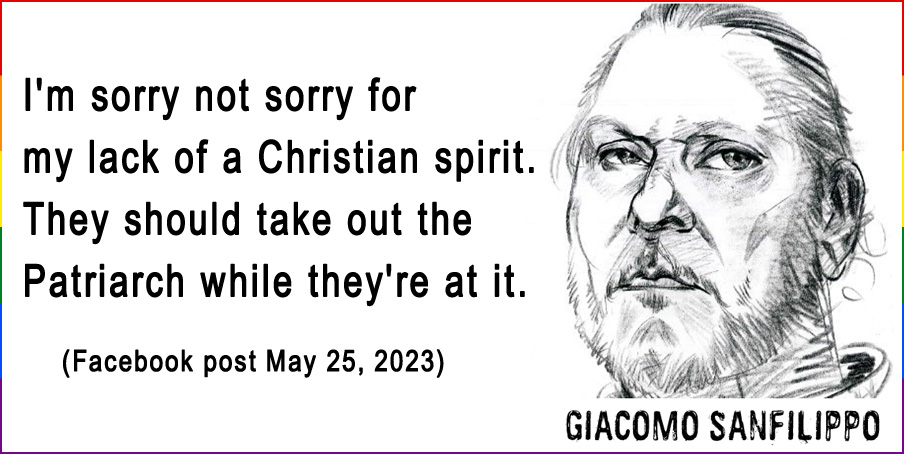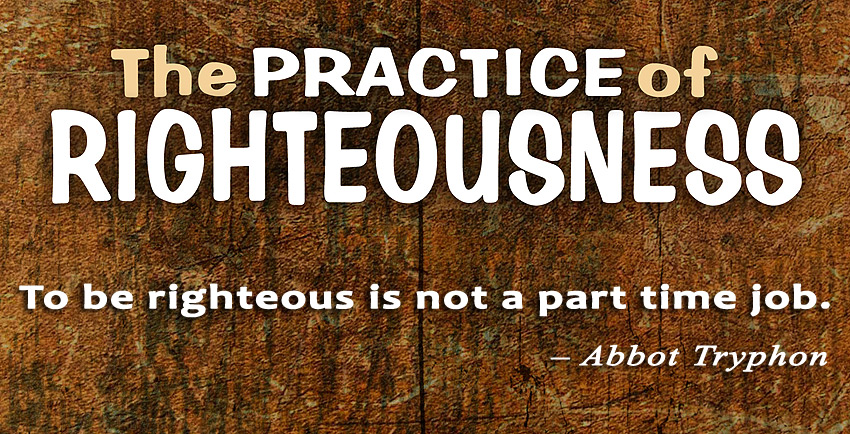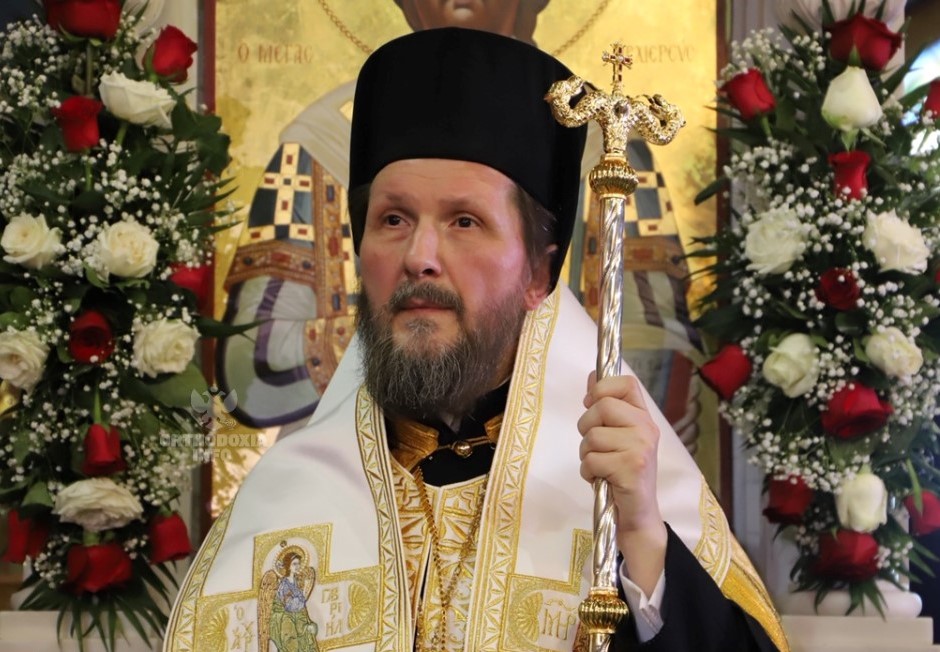OrthodoxyToday | by Fr. Gregory Jensen | 4/11/2010

On a post on my blog Koinoia (“An Editorial: Orthodoxy & the Public Square“), I wrote that whether or not I like Frank Schaeffer’s politics or his moral theology, or whether or not his support of abortion and gay rights are compatible with the tradition of the Church, the reality is that he is well within the mainstream of current Orthodox opinion in America. According to the PEW survey, the majority of Orthodox laity agree that abortion and gay marriage should be legal. It may surprise you, then, that the problem isn’t Schaeffer – it’s us; specifically, it’s the clergy. For reasons that are not entirely clear to me, we clergy are not effectively communicating the moral tradition of the Church to the laity. Or, if we are, the laity aren’t listening –- which would imply that the clergy are willing to tolerate the laity ignoring the Gospel.
We see the same prevalence of pro-choice, pro-gay marriage positions among Orthodox politicians. This kind of a consistent pattern of belief does not just happen. As in the Catholic Church, we see in the Orthodox Church evidence of a significant pastoral failing. This appears to be more than just a widespread lack of sound moral education for the faithful. It appears to be an embrace of, or at least resignation to, the influence of secularism in our parishes.
This is a very serious problem. This isn’t a debate about the practices of potentially faithful followers – as can be the case when addressing, say, Old Calendar or New Calendar, or the issue of women wearing headscarves, or whether priests should have beards and wear cassocks, or whether we have pews or not, or whether to use an organ to lead the choir. This goes much deeper – to the heart of Christian discipleship. It seems that we have simply lost sight of the beauty and power of Christian virtue; perhaps worse, it seems that we have given over leadership to moral barbarians.
I know that sounds like a harsh judgment, but what else can one call it? A barbarian isn’t a bad person. A barbarian isn’t likely to love his wife and children any less than you or I. He isn’t necessarily an atheist or polytheist. In fact, many barbarians believed –- and believe — in Christ, though for the same reason that they believed in the old gods: to secure power for their people.
John Courtney Murray writes in his introduction to The Civilization of the Pluralist Society that “the barbarian need not appear in bearskins with a club in hand,” Instead he:
…may wear a Brooks Brothers suit and carry a ball-point pen with which to write his advertising copy. In fact, even beneath the academic gown there may lurk a child of the wilderness, untutored in the high tradition of civility, who goes busily and happily about his work, a domesticated and law-abiding man, engaged in the construction of a philosophy to put an end to all philosophy, and thus put an end to the possibility of a vital consensus and to civility itself.
In Murray’s view, the perennial “work of the barbarian” is “to undermine rational standards of judgment, to corrupt the inherited intuitive wisdom by which the people have always lived.” He does this not “by spreading new beliefs” but,
…by creating a climate of doubt and bewilderment in which clarity about the larger aims of life is dimmed and the self-confidence of the people is destroyed, so that finally what you have is the impotent nihilism of the “generation of the third eye,” now presently appearing on our university campuses. (One is, I take it, on the brink of impotence and nihilism when one begins to be aware of one’s own awareness of what one is doing, saying, thinking. This is the paralysis of all serious thought; it is likewise the destruction of all the spontaneities of love.)
In the modern world, then, “the barbarian is the man who makes open and explicit rejection of the traditional role of reason and logic in human affairs. He is the man who reduces all spiritual and moral questions to the test of practical results or to an analysis of language or to decision in terms of individual subjective feeling.” By this criteria, it seems that we live in an increasingly barbarian world – even in our own parishes.
Faith & Reason or Force & Fear?
Though tempting, we should not dismiss his argument as extreme. Nor should we give in to the understandable desire to apply it to others but not ourselves. In both cases to do so is to flee in the face of “Christian theological intuition” as well as “all of historical experience” both of which remind us that. both personally and socially, we live “life always more or less close to the brink of barbarism.” The prospect of collapse into barbarism reflects the fragility of our world in both its physical and cultural dimensions. At the same time he is clear that threat we face today arises from more than the usual challenges to our health and well-being posed by “physical illness” or “the disorganizations of mental imbalance.” No, the real threat comes from “the decadence of moral corruption and the political chaos of formlessness or the moral chaos of tyranny.”However harsh this diagnosis might seem, I think that Murray is correct.
In a civilized society Murray says, we “live together according to reason, embodied in law and custom, and incorporated in a web of institutions that sufficiently reveal rational influences, even though they are not, and cannot be, wholly rational.” In a barbarous society, on the other hand, reason is no longer given its rightful place in human life and instead we “are huddled together under the rule of force and fear.”
Once force and fear come to dominate, as they do in the barbarous society, power becomes the key value. Now, it is certainly true that civilized societies are also concerned with power—with acquiring it, exercising it and even extending it. The difference is that for the barbarian, even the “Christian” barbarian, power is always an end in itself. Murray’s observation from almost 50 years ago is as true today as it was then. Looking around he saw the emergence of an increasingly barbarous society in which,
…economic interests assume the primacy over higher values; when material standards of mass and quantity crush out the values of quality and excellence; when technology assumes an autonomous existence and embarks on a course of unlimited self-exploitation without purposeful guidance from the higher disciplines of politics and morals (one thinks of Cape Canaveral); when the state reaches the paradoxical point of being everywhere intrusive and also impotent, possessed of immense power and powerless to achieve rational ends; when the ways of men come under the sway of the instinctual, the impulsive, the compulsive. When things like this happen, barbarism is abroad, whatever the surface impressions of urbanity. Men have ceased to live together according to reasonable laws.
You might well be asking at this point, what does any of this have to do with the life of the American Orthodox Church? I would suggest that in American culture we are facing trends that will ultimately lead to a barbarious society. This is not happening because this is a “Western Christian” society but because it is increasingly neither Western nor Christian. However unintentionally, many Orthodox Christian have allied themselves with our society’s willful rejection of its own Western Christian foundations. If we are not careful, we may find ourselves repeating the mistakes of “the eighteenth-century philosopher, who neither anticipated nor desired the brutalities of the Revolution with its Committee on the Public Safety” but who Murray argues, “prepared the ways for the Revolution by creating a vacuum which he was not able to fill.”
Painful though it is to acknowledge, many American Orthodox Christians find ourselves in the same position as traditional and observant Roman Catholics, Protestants, Jews or other religious believers. We are being attacked not only from the outside but we are increasingly being undermined from within. Part of this occurs as a result of our own efforts to “kick down the barricades.” It may be that this is done in the name of our specific concerns as Orthodox Christians, but it effectively serves the agenda of a pervasive and destructive barbarism that is beyond our ability to control or direct. In the end, I fear that we will find that our anti-Western Christian rhetoric is simply self-defeating.
Bad Money Drives Out Good
An Orthodox polemics that would dismiss Western Christianity as rotten to its core does nothing to advance the cause of the Orthodox Church. In fact – and I think the empirical evidence bears this out – rejecting the foundations of Western Christian culture and trying instead to create a Church that is thus divorced from the surrounding culture has undermined our ability to fulfill the mission of the Church. To understand why this is NOT in the Church’s best interest, let me borrow an idea from economics: Gresham’s law.
Named after the English financier during the Tudor dynasty Sir Thomas Gresham (1519 – 1579), Greshem’s law says that “Bad money drives out good.” In the Church, the “bad money” is our indifference, if not outright hostility, to Western Christian culture. The “good money” is not simply Western culture, but also the tradition of the Orthodox Church.
Having rejected a variety of Western insights that were immensely important in the development of western society – such as the partnership of faith and reason, natural law, and the objective and universal character of Christian morality (to name only three insights that Schaeffer dismissively touches on in his essay), we have — however inadvertently — allied the Church with the cultural forces of barbarism.
Our alliance with barbarism has happened because we have rejected the Christian roots of Western culture in a misguided effort to (1) keep the Church “Greek” (or “Russian,” or “Arab,” or “Serbian”) or (2) to distinguish “True Orthodoxy” from “false Catholicism” or (3) because, like Frank Schaeffer, we are simply cultural-despisers who have found that the Orthodox tradition is a convenient cudgel with which to continue waging our political or cultural battles. Whatever the reason, this amounts to a refusal to engage in any meaningful way with the cultural marketplace of ideas. As a result, it leaves the public square utterly naked — even as we moan and complain about it privately. Worse, it makes us the tools by which Nietzsche could proclaim that God was a non-factor (“dead”) in modern life. It puts us in a position where we not only fail America –- to be salt and light for our neighbor and our country — but also Christ and ourselves.
We should instead look at Western Christianity, and especially Roman Catholicism, as an ally. Yes, there are important differences that separate us and these differences should not be minimized. But neither should they be so emphasized that we find it impossible to work with others with whom we share a deep, common concern. Pastorally, this means that the challenge for the Orthodox Church is to become American among Americans, and –- in our own particular way — Western among Western Christians. This need not come at the expense of the faith — anymore than it did for the Fathers of the Church. It does however mean that we must do here and now as we have done at other times and other places. Like the Fathers, we must discern and nurture what is best in Western culture. Our failure to do this, and more importantly, our apparent unwillingness to do this, has not resulted in a stronger Church here in America but rather one that looks increasingly like an Eastern-rite Mainline Protestant denomination.
The use of the vernacular –- a gift that the West has borrowed from the East –- must mean more than serving Liturgy in the spoken language of the marketplace. It also means learning to faithfully express the meaning of the Gospel in the cultural life of our country. While not without risk, it will – when done successfully (and we have Christ’s promise that we will be successful) – not only grow the Church, but transform the culture.
The spiritual genius of the Orthodox Church has always been the ability of the Church to take on and transform the dominate culture. This means that just as Jesus was the authentic Jew among Jews, the Church has been – in turn – authentically Greek among the Greeks, and authentically Russian among the Russians, so too we must be authentically American among the Americans. While have rarely done this perfectly, we have largely done this without sacrificing the Gospel or the communion of the various local or ethnic churches.
Is there any reason, other than sloth or despair, why we think we cannot do this in America as well?
HT: OrthodoxyToday



